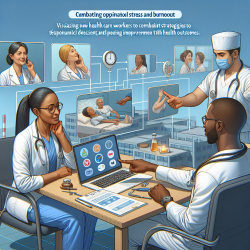Understanding Burnout in Health Care Workers: Insights and Solutions
Burnout among health care workers is a critical issue that affects not only the well-being of the providers but also the quality of care they deliver. A recent study conducted in Lusaka District, Zambia, sheds light on the prevalence of burnout and the utilization of HIV services among health care workers. This research provides valuable insights that can be used to improve the skills and outcomes of practitioners in similar settings.
Key Findings from the Research
The study, conducted from March to June 2007, involved 483 active clinical staff from 13 public clinics in Lusaka. It revealed that 51% of the respondents reported experiencing occupational burnout. The primary risk factors included having another job and knowing a co-worker who left the job in the past year. The reasons for co-worker attrition included better pay, feeling overworked, and stress.
Additionally, the study highlighted concerns about confidentiality as a major barrier to HIV testing among health care workers. Despite 81% of the respondents having tested for HIV, focus group discussions suggested a perception of low testing rates due to confidentiality concerns.
Implementing Research Outcomes
Health care practitioners can leverage the findings of this study to enhance their professional environment and personal well-being. Here are some strategies to consider:
- Address Workload and Stress: Implementing task-shifting strategies and employing lay health workers can help distribute the workload more evenly, reducing stress and burnout.
- Enhance Confidentiality Measures: Establishing strict confidentiality protocols and providing private testing options can encourage more health care workers to utilize HIV services without fear of stigma.
- Promote Mental Health Resources: Offering workshops on stress management and burnout prevention can equip health care workers with tools to cope with occupational stress effectively.
- Encourage Peer Support: Developing peer support groups can provide a platform for health care workers to share experiences and strategies for managing stress and burnout.
Encouraging Further Research
The study underscores the need for further research into the effects of burnout on health care delivery and patient outcomes. Practitioners and researchers are encouraged to explore the following areas:
- Impact on Patient Care: Investigate how burnout affects the quality of care provided to patients and identify strategies to mitigate these effects.
- Longitudinal Studies: Conduct long-term studies to understand the progression of burnout and its impact on health care workers' careers.
- Comparative Analysis: Compare burnout rates and coping mechanisms across different regions and health care settings to identify best practices.
By addressing the factors contributing to burnout and enhancing the utilization of HIV services, health care systems can improve workforce stability and patient outcomes. Practitioners are encouraged to apply these insights to their practice and contribute to a healthier work environment.
To read the original research paper, please follow this link: Burnout and use of HIV services among health care workers in Lusaka District, Zambia: a cross-sectional study.










